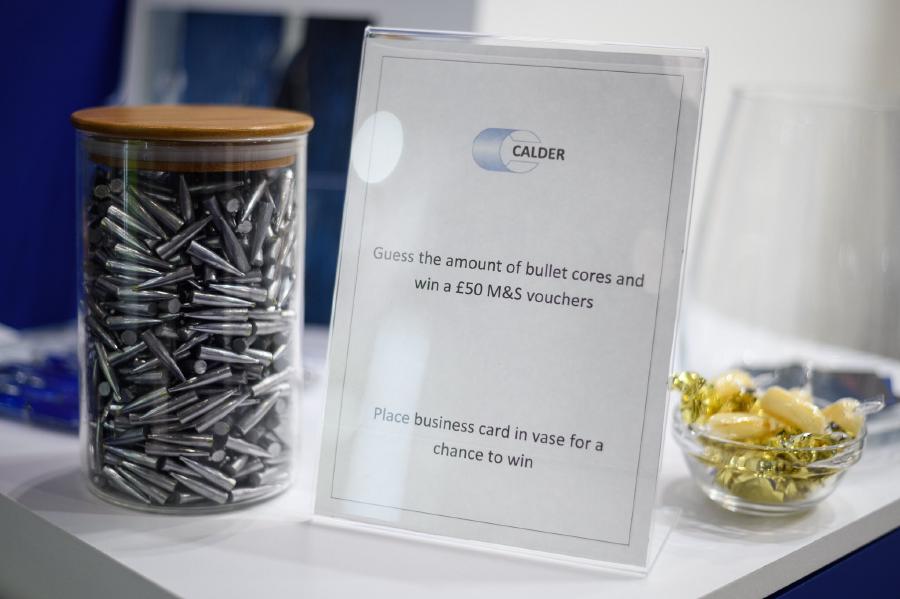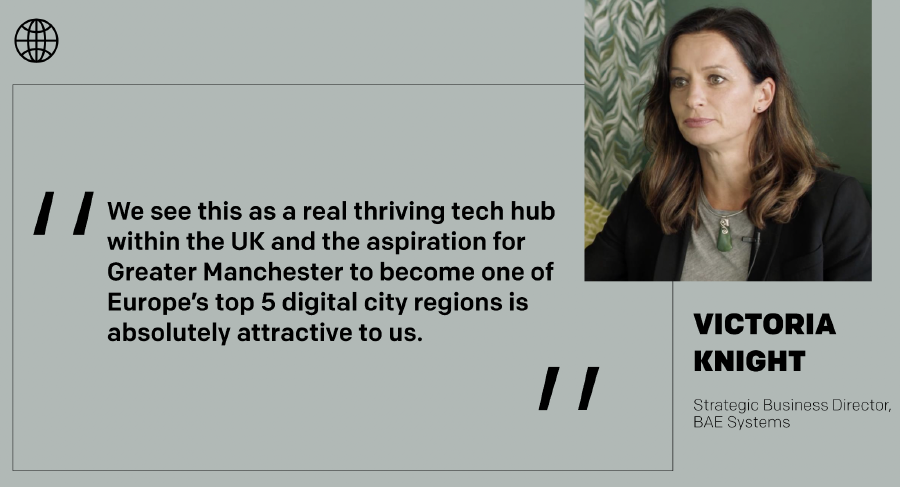Blog
What happened to Nuclear Free Manchester?
Once upon a time, Manchester saw itself as a leading light in the fight against nuclear annihilation.

Now not only do we have several companies here who manufacture or assist in the production of nuclear missiles and submarines, we put ’em in the regional marketing brochure.
It’s the last day of Defence & Security Equipment International (DSEI), one of the world’s largest arms fairs hosted in London every two years. From Stop The Arms Fair’s website:
In 2019, DSEI brought together 36,000+ arms buyers and dealers from 114 countries to network and make deals. In 2021, governments and military delegations will be browsing the wares of 1,600+ arms companies selling everything from guns and bombs to fighter jets and warships, with live action demos promised to take place in the Royal Victoria Dock.
[…]
DSEI is an important event for the UK state, which heavily subsidises and promotes the arms industry, and helps organise the arms fair. In 2019, the UK invited delegations to DSEI from 67 countries, including countries involved in military conflicts and at war, and on its own list of human rights abusers.
If you want to know where the really really bad people in the world get their guns and ammo, it’s here. If you’re a repressive government such as Saudia Arabia, UAE or USA looking to buy anything from torture equipment to chemical weapons to helicopters, DSEI has you covered. In fact, the UK government will pay for your delegation to come over, give you a stall to sit on all week while people come and pitch you weapons, and lay on millions of pounds of policing to protect you while you’re here. You can even speculate on how many bullets are in a jar and win a prize!

Sounds bad, so what’s this got to do with Manchester?
The companies paying exhibitor’s fees at DSEI all have to operate somewhere. And a decent number exist in Manchester. Companies with HQs in GM exhibiting at DSEI are selling a range of products from the mundane to the world ending, such as: signage (3M), mechanical simulators (Pennant International Limited); ammunition (Edgar Brothers, Arralis); aircraft and aircraft materials (Thales, Safran); telephony solutions (Vodafone, VITEC); cyber security and intelligence (Geollect); combat drones (Elbit); and literal nuclear missiles (Northrop Grumann)1.
GfSC’s rough review of the DSEI exhibitor list shows about 60 companies who are based here, are part of a parent company that’s based here, or who are pretty vague about their address but all signs points to Manchester.
But isn’t Manchester meant to be the city of peace?
Quite. In 1980, Manchester declared itself a Nuclear Free City.
On November 5, 1980 Manchester became the world’s nuclear free city - placing itself at the forefront of the campaign to ban atomic weapons.
The city council called upon the government to ‘refrain from the manufacture or position of any nuclear weapons of any kind within the boundaries of our city’ - and called for local authorities throughout Great Britain to do the same.
In 2005, one of the architects of this declaration Cllr Bill Risby stated:
Establishing the council’s nuclear free policy was one of the proudest moments of my life. At the time no one could have foreseen how the movement would grow.
in the 1980s-90s the slogan “Manchester: a Nuclear Free City” was widely used on signs. You can still see them around town today. This Manchester Evening News longread talks about the history of where it came from.


So what went wrong?
Who knows. The Andy Burham administration now seems to be welcoming in these companies with open arms (sorry).
Let’s take BAE Systems. According to Campaign against the Arms Trade (CAAT)
BAE’s Typhoon and Tornado aircraft have been central to Saudi Arabia’s devastating attacks on Yemen – attacks that have killed thousands and created a humanitarian disaster. Further Typhoon aircraft have been delivered to Saudi Arabia during the bombing and BAE and the UK government are pushing hard for a new contract.
BAE has 6,300 staff in Saudi Arabia to support the operational capabilities of the Saudi armed forces. In 2016, during the attacks on Yemen, the company stated that “the Group’s extensive in-Kingdom training and support activities are at a high tempo. The Royal Saudi Air Force has achieved high utilisation and aircraft availability across its Typhoon and Tornado fleets, operating under demanding conditions.”
BAE also own the company that created the Trident nuclear submarine fleet.
Sounds bad right? Well, not according to GMCA who literally put them in the brochure for the Greater Manchester Strategic Framework, alongside a quote from someone with a truly Bond-villan-esque name and job title.

Other companies who presented at DSEI 2021 actively welcomed by various parts of GMCA include:
- Northrop Grumann, who as cannot be stressed enough, make nuclear missiles, and sponsor research articles with names like “The Downsides of Downsizing: Why the United States Needs Four Hundred ICBMs”. GMCA see their operations in Greater Manchester as a “Cyber Ecosystem Milestone” on their website.
- CACI, a huge conglomerate implicated in war crimes including torture outsourced to them by the CIA at Abu Ghraib prison. Transport for Greater Manchester (TFGM) saw fit to commission them to do research on bike hire schemes.
- Elbit Systems (previously Elbit Ferranti), Israel’s largest privately-owned arms company which mainly ships unmanned drones to Israel that are used to bomb Palestinians. You can read more about Elbit on Palestine Action’s website. And by the way, Manchester University has been more than happy to help with the research to make them even better.
- The effect of this concentration of arms and cybersecurity companies is so powerful companies like UK Fast are pivoting to defence, proudly stating on their website they provide hosting for MBDA systems who provide missiles to the Saudia Air Force to bomb Yemen.
- Co-op Digital worked with Thales, who provide equipment to the UK army to stop migrants crossing the channel among other things, to teach children to code (presumably ‘how to stop children just like you reaching our shores!’)2.
- All the big companies seem to be at it on the education from too. Raytheon cyber academy is also part of the “Cyber Ecosystem Milestones”, and Raytheon are involved in sponsoring training for women to “get into code”. BAE Systems have opened an academy to train people how to build nuclear submarines in Barrow, Cumbria. And through GMCA’s Cyber Advisory Group these companies form a panel with all the local universities and authorities.
So what now?
Manchester is no longer a nuclear free city. Not only do we have several companies here who manufacture or assist in the production of nuclear missiles and submarines, these companies are put front and centre in the brochure GMCA uses to advertise the region to investors.
GM’s speciality seems to be pushing programming and cybersecurity. It’s very unclear what these jobs are and in fact it’s hard even to find an office address for BAE systems in the area. We imagine “cybersecurity” is a catchall for a wide range of software used in warfare, such as operating systems for missiles and planes, VoIP interception algorithms, software to spy on both domestic and foreign citizens and governments, facial regonition AI, etc.
Frankly we think these companies shouldn’t exist at all in their current form. And we certainly think working for them shouldn’t be seen as a reputable career, but a dirty part of the British Empire’s colonial legacy. There is simply no justification for the manufacture and distribution of these weapons which are used to murder civilians, destabilise countries, repress populations, destroy the environment, and facilitate vast networks of international corruption.
And please, stop taking money from arms companies to teach children you absolute ghouls.
-
For the avoidance of doubt not all these things are manufactured here but their offices, sales structure, admin etc are. ↩︎
-
This is extra weird when you consider the banking division of the co-op has an ethical policy prohbiting this. ↩︎